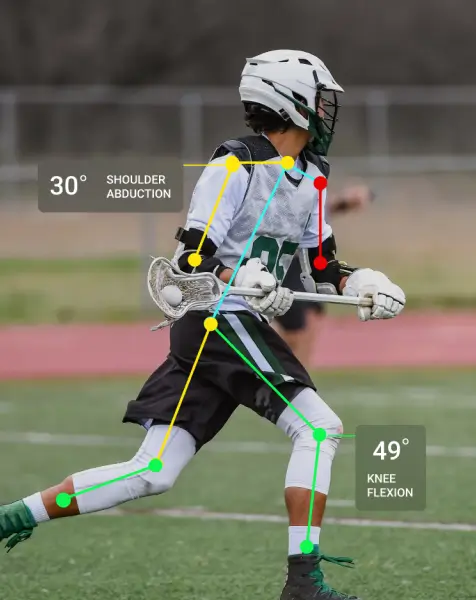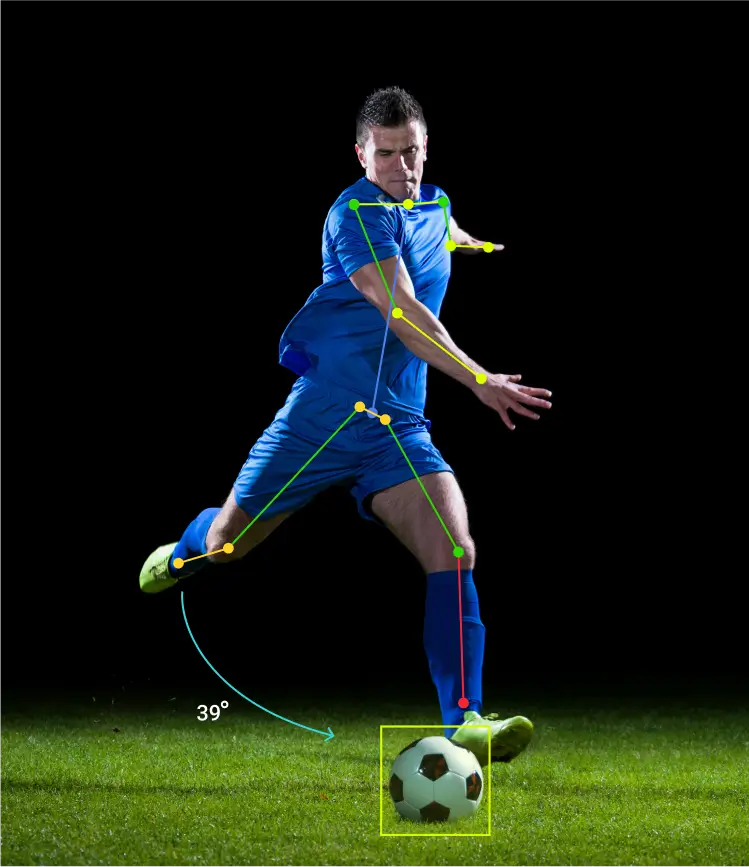AI in Sports
Advanced AI solutions that turn sports data into championship-winning insights for teams, coaches, and athletes worldwide
Top teams around the world are already using AI to win more games, keep their athletes healthy, and make smarter decisions during crucial moments. From instant game insights to predicting what opponents will do next, this technology is changing how champions train and compete.
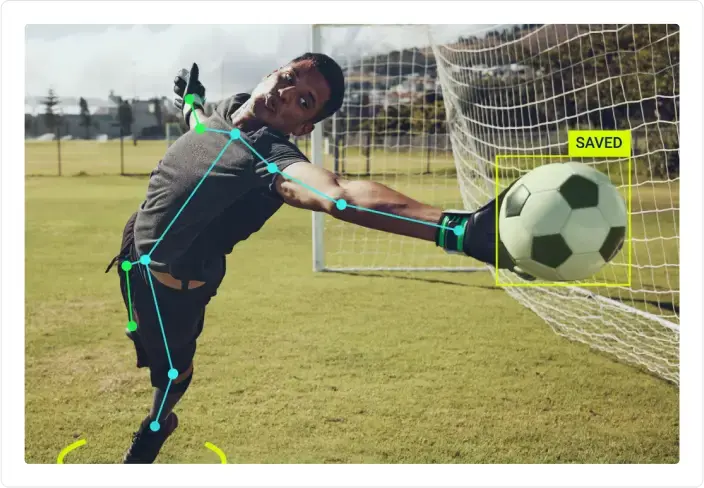
What is AI in Sports?
Artificial intelligence (AI) in the sports industry is a game-changing technology that turns video footage and sensor data into actionable insights for athletic success.
This technology analyzes years of game footage in minutes, identifies winning strategies, and gives you the competitive intelligence that separates good teams from great ones.
Common AI in sports examples include real-time player tracking during NBA games, automated tactical analysis in Premier League football, and biomechanical assessment in Olympic swimming training
Transform Legacy Processes in Sports with AI

Machine Learning
Predictive performance models and injury risk assessment

Computer Vision
Real-time movement analysis and tactical recognition

Natural Language Processing
Automated scouting reports and fan engagement content

Deep Learning
Advanced pattern recognition for strategic optimization
Benefits of AI in Sports
To understand how is AI used in sports effectively, here are the key performance enhancement benefits:

Data-Backed Coaching Strategies
Transform intuition into precision with AI-powered game plans that adapt to opponent weaknesses and maximize team strengths.

Advanced Injury Prevention
Early detection systems monitor biomechanics and fatigue patterns to keep athletes performing at peak levels throughout the season.

Enhanced Fan Engagement
AI-curated content and personalized experiences that deepen supporter loyalty and increase revenue opportunities.

Quantifiable ROI for Sponsorships
Precise measurement of brand visibility and engagement metrics that maximize partnership value.

Accelerated Player Development
Intelligent scouting and training optimization that identifies talent faster and develops skills more efficiently.
Core Solutions We Offer
We provide specialized AI solutions that directly address the critical challenges facing modern sports organizations today.

Sponsorship Intelligence
AI-powered brand visibility tracking that measures real-time impressions, engagement metrics, and sponsorship ROI across broadcast, digital, and social channels. Our intelligent recognition technology analyzes 8,000+ brands across 24/7 programming to deliver precise valuation data that maximizes partnership investments.
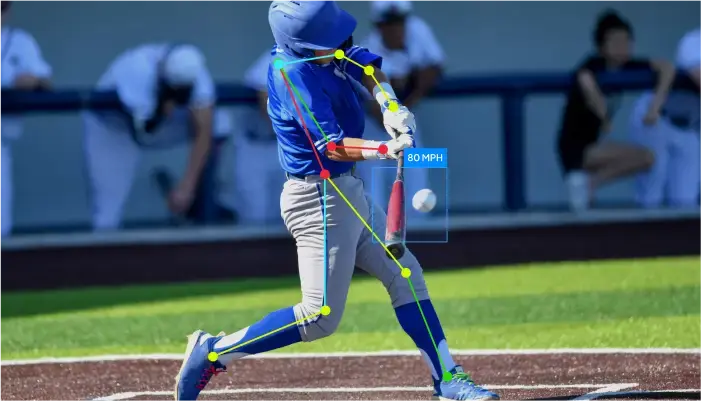
Video Analysis in Sports
Computer vision technology that transforms game footage into actionable coaching intelligence. Advanced movement analysis, tactical pattern recognition, and performance optimization tools that provide instant feedback for technique improvement, injury prevention, and strategic advantage development.
AI-Powered Insights by Sport
Sport-specific AI solutions engineered to address the unique performance demands and strategic requirements of each athletic discipline.
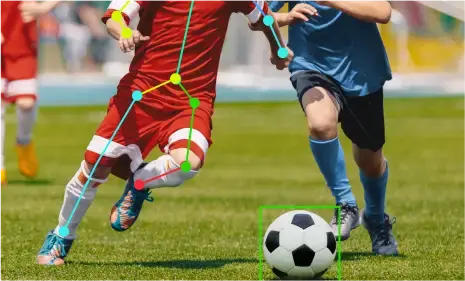
Tactical formation analysis and player positioning optimization.

Cricket Video Analysis
Intelligent diagnostics, patient engagement, and data extraction.
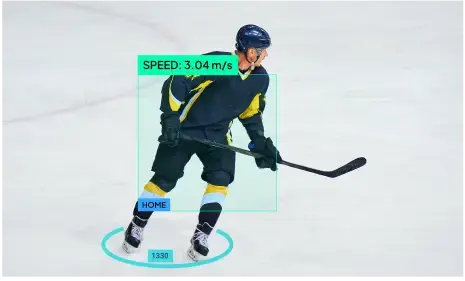
Ice Hockey Video Analysis
Speed tracking and defensive strategy evaluation
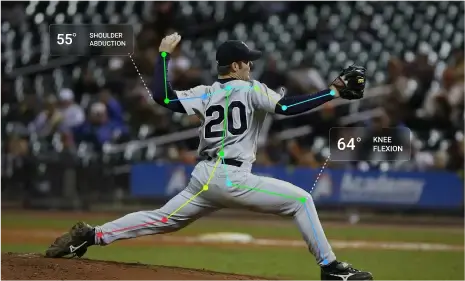
Pitch analysis and swing mechanics optimization

Basketball Video Analysis
Pitch analysis and swing mechanics optimization

Swimming Video Analysis
Stroke technique and turn efficiency improvement
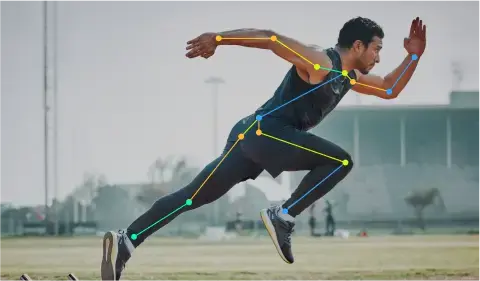
AI Gait Analysis
Biomechanical analysis that identifies movement inefficiencies and injury risks to help athletes improve performance.
How is AI Changing the Sports Dynamics?
AI is helping athletes get better faster, making games more exciting for fans, and helping sports teams make smarter business decisions at every level.
Performance Revolution

Real-Time Performance Tracking
Advanced computer vision solutions for play fields and sensor data analysis to provide instant biomechanical feedback and performance tracking metrics like speed zones, explosive moments, distance covered, acceleration, and deceleration patterns.

Automated Video Analysis
Intelligent systems deliver comprehensive tactical breakdowns and player performance reports within minutes of game completion

Advanced Injury Prevention
Early detection systems monitor biomechanics and fatigue patterns to keep athletes performing at peak levels throughout the season.

Enhanced Fan Engagement
AI-curated content and personalized experiences that deepen supporter loyalty and increase revenue opportunities.

Personalized Fan Experiences
Intelligent content generation and interactive commentary create deeper engagement that increases viewership and revenue streams

Sponsorship Value Optimization
Precise brand exposure measurement and engagement analytics that demonstrate clear ROI for marketing partnerships
Who is this for?
Intelligent AI solutions designed to meet the specific performance challenges and strategic objectives of sports professionals at every level.

Coaches & Analysts
Access real-time, data-driven insights that transform tactical decision-making and accelerate team performance improvements

Trainers & Physiotherapists
Leverage predictive analytics for injury prevention, recovery optimization, and biomechanical assessment tools

Sports Academies
Implement cost-effective AI solutions that enhance training outcomes and identify promising talent more efficiently

Team Managers
Focus on maximizing player investment returns while minimizing performance risks through intelligent analytics

Broadcasters & Sponsors
Gain precise brand visibility measurement and create interactive fan experiences that drive engagement and revenue

Sports Federations
Deploy scalable evaluation systems for performance tracking and strategic development across multiple organizational levels
Artificial Intelligence Framework for The Sports Industry
Here’s our systematic approach that connects player data, video analysis, and predictive insights to help teams make smarter decisions and achieve better results.
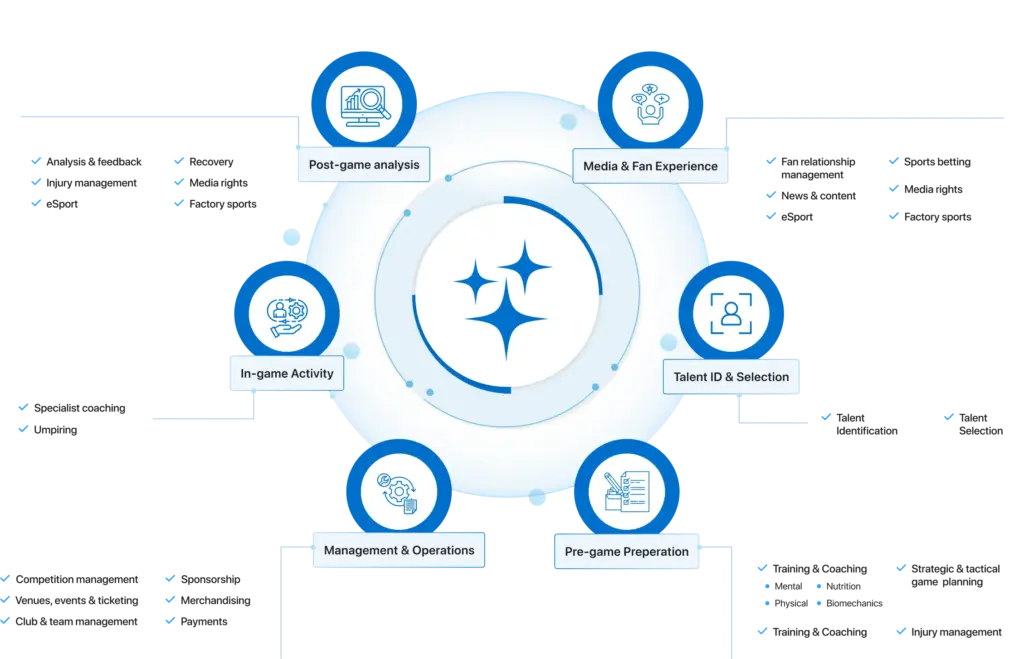
Why Work With Us
At Folio3 AI, we have proven expertise in delivering AI solutions that transform sports performance and drive measurable results for organizations worldwide.
Our Competitive Advantages:

Demonstrated Success
Extensive experience developing AI and computer vision projects for sports organizations across multiple disciplines and performance levels.

Customized Solutions
Customized solutions designed specifically for each sport's unique requirements and organizational objectives.

Scalable Technology
Advanced systems capable of real-time and post-match analysis that grow with your organization's expanding needs.

Global Trust
Relied upon by international sports organizations, professional teams, and elite training facilities for performance-critical applications.

Proven ROI
Documented performance improvements and cost reductions that demonstrate clear value for technology investments.
Frequently Asked Questions
What is AI's role in sports today?
AI in sports helps teams analyze performance data, identify patterns in gameplay, and provide coaches with insights for tactical decisions. Professional sports organizations use AI technology for video analysis, player tracking, and performance monitoring. AI systems process game footage and sensor data to create reports that help coaches understand team strengths, weaknesses, and areas for improvement.
Can AI help reduce injuries in athletes?
Yes, AI systems can assist with injury prevention by monitoring athlete movement patterns and identifying potential risk factors. These tools analyze biomechanical data during training and games to help coaches and trainers make informed decisions about player workloads and training adjustments.
Is AI in sports only for professional teams?
No, AI in sports technology is available for organizations at various levels, including college programs, high school teams, and youth academies. Many platforms offer different pricing tiers to accommodate different budgets and organizational needs. The accessibility of AI tools has increased as technology costs have decreased and user-friendly solutions have been developed..
How accurate are AI-powered video analysis tools?
AI sports video analysis tools vary in accuracy depending on the specific system, sport, and conditions. Leading platforms like Hudl, Catapult, and similar technologies use machine learning algorithms that continue to improve over time. The accuracy of these tools is generally sufficient for coaching analysis, though performance can be affected by factors like video quality, lighting, and camera angles.
How long does it take to implement AI in a team's workflow?
Implementation time depends on the complexity of the chosen system and the organization's technical requirements. Basic video analysis solutions can typically be set up within days, while more comprehensive AI solutions may require several weeks for full integration and staff training. Most organizations benefit from gradual implementation and proper training to maximize the value of their AI investment.








